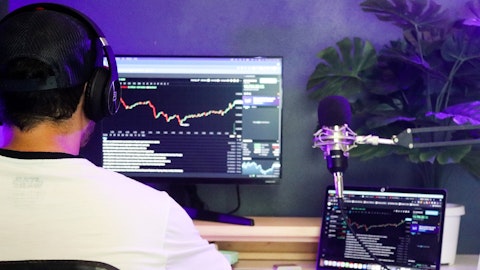Lucas Lira: Thanks, Jean. Hello, everyone. Our financial performance in the quarter illustrates well how our renewed focus around value creation is translating into results. I like to say to our team that there is life beyond EBITDA and that the way forward is to keep embedding into our decision making process greater focus around cash flow generation and invested capital. The changes we implemented in Argentina that Jean alluded to are a great example of this approach working well. But let me focus on our consolidated performance. We delivered in the quarter about R$ 4 billion of normalized profit, a 25% increase versus last year. In addition to our EBITDA growth, what made a big difference were our net finance results, which improved a little over R$ 400 million year-over-year.
And within our net finance results, the biggest factor was the reduction in losses on derivative instruments. Thanks to our decisions relating to hedging in Argentina, namely structural reduction of our USD exposure and a shorter hedging time horizon, as well as lower carry costs in Brazil, we should continue to see a benefit for the remainder of the year, albeit to a lesser extent. Cash flow from operating activities totaled nearly R$ 8 billion in the quarter, which is about R$ 1.8 billion above Q3 2022. Year-to-date, we’ve delivered almost R$ 2 billion more than 2022. Performance improved across the board with better cash flow from operating activities in all regions, led by Brazil and CAC. And in terms of working capital, the highlight was around reduced inventory levels, particularly in terms of packaging and raw materials, which continued to improve year-over-year, given our team’s focus and how much input cost pressures and supply chain disruptions in recent years adversely impacted our inventory cost going into 2023.
Despite the stronger performance through September 30, Q4 is historically the most relevant quarter in terms of cash flow generation, so we still have a lot of work to do. Now, I want to turn to a couple of other relevant topics. Taxes and the exercise of the put option related to the Dominican Republic. Let me start with tax reforms in Brazil. As you may recall, the tax reform on consumption is intended to simplify the different federal, state and municipal indirect taxes, while not increasing the overall tax burden. The text approved by the House of Representatives is currently being reviewed in the Senate, and the amended text is expected to go to a vote in the Senate floor in November. We will be better positioned to comment further upon the final approval by Congress, which is still expected before year end.
In our view, the focus of any tax reform should be on reducing the complexity of the Brazilian tax system and not increasing the total tax burden, which is already among the highest in the world. As for income taxes, there are two important updates. First, during Q3, draft legislation was finally submitted to Congress by the federal government regarding the deductibility of the IOC, the text is currently in the House of Representatives, and timing going forward remains unclear. However, it’s worth noting that instead of the complete elimination of the IOC deductibility, the potential changes to the existing framework may also include either adjustments to the legal parameters for purposes of the calculation and deductibility of the IOC, or substitution of the IOC with an allowance for corporate equity mechanism.
We will keep the market informed should the legislative process move forward. And the second important update is that the federal government also submits [indiscernible] of state VAT tax incentives. The potential implications to our business will ultimately depend on the nature and the extent of potential changes to the existing framework, which are still rather unclear and therefore may or may not have a relevant impact to the company. And regarding the put option in the Dominican Republic, last week we received notice that Empresas Leon Jimenes decided to exercise its put option that was set to expire next December with respect to part of their stake in our business in the Dominican Republic and certain other CAC markets. We expect the disbursement to acquire such stake to take place in January 2024 and should total approximately R$1.8 billion, subject to the terms of the existing agreements with Empresas Leon Jimenes.
For further details, please refer to Note 27 to our financial statements. Finally, I would like to invite everyone to join our sustainability update, which will take place on November 23. In addition to providing an update on our progress in terms of sustainability initiatives, the idea for this year’s broadcast is to also cover how for us, sustainability is about ensuring a solid governance and ethics framework for creating long term value. The program includes the participation of our senior management as well as representatives of our board of directors and fiscal council. That’s it for me. Thank you and we can move to Q&A.
Q – Isabella Simonato: Thank you. Good afternoon everyone. Thank you for the call. I have a couple of questions. Jean you mentioned in the remarks that the cost performance for beer in Brazil was not only driven by FX and raw materials, but also by efficiencies right across the supply chain. So I was wondering if we could get a little bit more color on the contribution of each factor in another way. Right out of this 2% decline, what is the proportion that you attribute to lower raw materials versus the efficiencies you are getting? So that could be the first one. And the second one still on Beer Brazil, but I think we saw a lower than expected SG&A pretty much across the board. How can we think about this line going forward, right? Can we still think SG&A going up in line with inflation for 2024 or is there anything different that we should take into consideration? Thank you.




